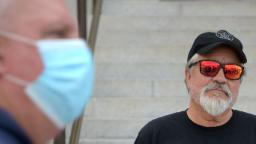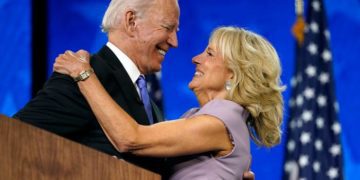For some, the tension over face masks has resulted in great personal loss. On May 1, Calvin Munerlyn, a security guard at a Michigan Family Dollar store,
was shot to death while reportedly enforcing the state’s policy to wear face coverings in enclosed public spaces.
Percolating beneath the more general pandemic stress is a political divide cleaving us over the role of government, science and even truth.
On April 30,
some 400 to 700 protesters descended on the Michigan Capitol building to demonstrate against Democratic Gov. Gretchen Whitmer’s stay-at-home order, which was issued in March following the declaration of a state of emergency that was set to expire at the end of the day. (
She later signed executive orders that put in place a new state of emergency through May 28.)
Conspicuously, most weren’t wearing face masks.
Speaking with CNN’s Jake Tapper on Sunday,
Whitmer said that the protesters, whom President Donald Trump sided with, dredged up “some of the worst racism and awful parts of our history in this country.”
“The Confederate flags and nooses, the swastikas, the, you know, behavior that you’ve seen in all of the clips, is not representative of who we are in Michigan. And the fact of the matter is, I mean, we’re in a global pandemic,” she said, adding that “we need to listen to the expertise and our institutions of higher learning and our health system and make decisions that are going to protect the lives of everyone.”
This cultural and political divide has been apparent even beyond the
extreme protests occurring across the country.
On April 30, the city of Stillwater, Oklahoma, issued an emergency proclamation requiring, among other things, the use of face coverings in stores and restaurants to slow the virus’s spread. But officials
amended it the next day, after a rash of verbal abuse and threats of physical violence.
“Many of those with objections cite the mistaken belief the requirement is unconstitutional, and under their theory, one cannot be forced to wear a mask,”
city manager Norman McNickle said in a statement, referring to what tends to be a
conservative talking point in arguments in favor of flouting certain public-health guidance. “No law or court supports this view. … It is further distressing that these people, while exercising their believed rights, put others at risk.”
(Notably, masks without medical-grade respirators are
less for the wearers than the people around them whom they could unknowingly transmit the virus to.)
This followed a similar U-turn elsewhere in the country. On April 28,
Ohio’s Republican Gov. Mike DeWine reversed an announcement he made the previous day requiring state residents to wear face masks in stores.
“It became clear to me that that was just a bridge too far, that people were not going to accept the government telling them what to do,”
he told ABC News on Sunday. “Generally, Republicans are less inclined to have the government tell them what to do.”
It’s another instance of one side of the political aisle disbelieving or disregarding science. And in light of
new modeling projecting that cases and deaths will increase as states ease restrictions, it’s the kind of move that could threaten people’s actual lives.
Crucially, there are people who obey or ignore medical authorities’ recommendations without intending to advertise their political opinions. Moreover, some have legitimate reasons for being wary of wearing face masks.
“We have a lot of examples of the presumed criminality of black men in general,”
Trevon Logan, an economics professor at Ohio State University, told CNN in April. “And then we have the advice to go out in public in something that … can certainly be read as being criminal or nefarious, particularly when applied to black men.”
That said, as parts of the country contemplate reopening, it’s hard to ignore how these strange times have transformed face masks from tools to promote public health into statements with political valence — and with very real consequences.


















